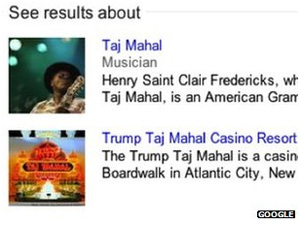



Date:19/05/12
 Google has revamped its search engine in an attempt to offer instant answers to search questions.
Google has revamped its search engine in an attempt to offer instant answers to search questions.
A new function, the Knowledge Graph, will make the site's algorithms act "more human", the site said in a blog post.
The feature will at first be available to US-based users, but will be rolled out globally in due course.
It follows similar efforts by rival Bing to provide added search content beyond the typical list of links. Microsoft's search engine launched its "snapshot" column last week as part of a wider site redesign.
Google's senior vice-president of engineering, Amit Singhal, explained that, until now, the search engine had been able only to match keywords, rather than understand context.
Mr Singhal said the words "Taj Mahal" could mean different things to different people.
"You might think of one of the world's most beautiful monuments, or a Grammy Award-winning musician, or possibly even a casino in Atlantic City, NJ. Or, depending on when you last ate, the nearest Indian restaurant," he said.
Key information
Google said the Knowledge Graph has been programmed to use around 3.5 billion different attributes to organise results, meaning it could now group results according to those various alternative interpretations.
For some searches, such as on prominent people, Google will automatically pull up a summary box with key information on that topic.
In doing so the search engine would need to draw on multiple sources and factor in many different criteria.
This kind of computational, intelligent search is currently pioneered by the likes of Wolfram Alpha - a site that gathers verified data, such as from the World Health Organization, to provide statistical results.
It has long been a technological goal to produce search engines that could react entirely naturally to human-like queries. One such effort includes the search engine Ask Jeeves, where users can ask a stereotypically English butler for help.
Google makes search 'more human' with Knowledge Graph
 Google has revamped its search engine in an attempt to offer instant answers to search questions.
Google has revamped its search engine in an attempt to offer instant answers to search questions.A new function, the Knowledge Graph, will make the site's algorithms act "more human", the site said in a blog post.
The feature will at first be available to US-based users, but will be rolled out globally in due course.
It follows similar efforts by rival Bing to provide added search content beyond the typical list of links. Microsoft's search engine launched its "snapshot" column last week as part of a wider site redesign.
Google's senior vice-president of engineering, Amit Singhal, explained that, until now, the search engine had been able only to match keywords, rather than understand context.
Mr Singhal said the words "Taj Mahal" could mean different things to different people.
"You might think of one of the world's most beautiful monuments, or a Grammy Award-winning musician, or possibly even a casino in Atlantic City, NJ. Or, depending on when you last ate, the nearest Indian restaurant," he said.
Key information
Google said the Knowledge Graph has been programmed to use around 3.5 billion different attributes to organise results, meaning it could now group results according to those various alternative interpretations.
For some searches, such as on prominent people, Google will automatically pull up a summary box with key information on that topic.
In doing so the search engine would need to draw on multiple sources and factor in many different criteria.
This kind of computational, intelligent search is currently pioneered by the likes of Wolfram Alpha - a site that gathers verified data, such as from the World Health Organization, to provide statistical results.
It has long been a technological goal to produce search engines that could react entirely naturally to human-like queries. One such effort includes the search engine Ask Jeeves, where users can ask a stereotypically English butler for help.
Views: 1271
©ictnews.az. All rights reserved.Similar news
- 24% of U.S. Adults have made phone calls on the Internet
- UNESCO puts sustainable learning online
- Australia gives incentives for the use of telehealth
- US launches computer programme for poor kids
- UN declares web access as human right
- Facebook growth slows in stalkerbase heartlands
- One Third of Millionaires Use Social Media
- Facebook Seeks Bigger Role in Software for Mobile Apps
- Icann increases web domain suffixes
- IBM launches new social networking platform for enterprises
- Google Notches One Billion Unique Visitors Per Month
- Internet providers cut international channel renting costs by 60%
- Azerbaijan launches standard time on internet
- Icann launches facility to ease DNSSec adoption
- Social network data mining yields worrying results for traditional media





















